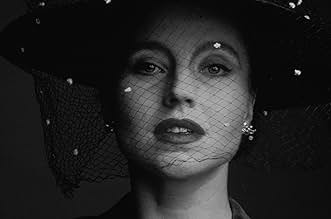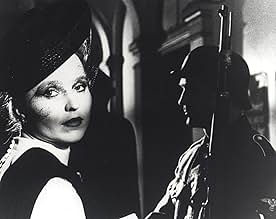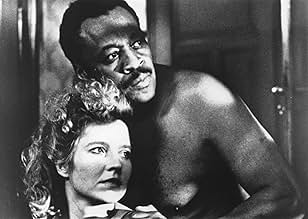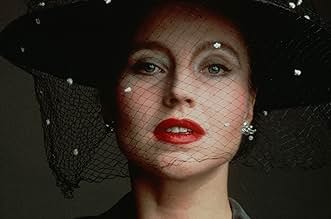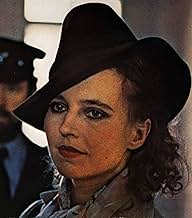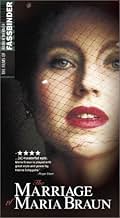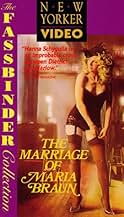NOTE IMDb
7,7/10
16 k
MA NOTE
Une veuve de la Seconde Guerre mondiale tente de s'adapter à la vie dans l'Allemagne d'après-guerre.Une veuve de la Seconde Guerre mondiale tente de s'adapter à la vie dans l'Allemagne d'après-guerre.Une veuve de la Seconde Guerre mondiale tente de s'adapter à la vie dans l'Allemagne d'après-guerre.
- Réalisation
- Scénario
- Casting principal
- Récompenses
- 13 victoires et 7 nominations au total
George Eagles
- Bill
- (as George Byrd)
Günter Lamprecht
- Hans Wetzel
- (as Günther Lamprecht)
Avis à la une
We watched this film in our German Cinema class at university some years ago, and I still remember it well.
Without wishing to give too much away, it tells the tale of a woman who, seeing the desolate landscape that Germany was in 1945, determines to build herself a comfortable life and, as she does so, she becomes one of many women in Germany rebuilding the nation. This was a time, historically, when the women were a greater driving force in the social and economic rebuilding of the nation than were the men (who were both lacking in credibility following the horrors and the mess of the years past, and somewhat dazed by what the nation had just been through).
As she builds that life (and in so doing helps to rebuild the nation), however, she finds that she may have sacrificed too much.
It is a movie worth watching in order to gain some understanding of what life was like in Germany from 1945 to roughly 1970. Rainer Fassbinder makes use of images in places which show the transition of German society from broken ruins to economic superpower, the changing status of women in German society over that time period, the changing attitudes both within Germany and from outside toward Germany, and the sacrifices that women were prepared to make in order to build the Germany that they ultimately did. It also asks, though, if the single-minded pursuit of rebuilding the nation economically and materially did not take too much out of the nation and the people in other areas.
I enjoyed the movie, and am happy to recommend it.
Without wishing to give too much away, it tells the tale of a woman who, seeing the desolate landscape that Germany was in 1945, determines to build herself a comfortable life and, as she does so, she becomes one of many women in Germany rebuilding the nation. This was a time, historically, when the women were a greater driving force in the social and economic rebuilding of the nation than were the men (who were both lacking in credibility following the horrors and the mess of the years past, and somewhat dazed by what the nation had just been through).
As she builds that life (and in so doing helps to rebuild the nation), however, she finds that she may have sacrificed too much.
It is a movie worth watching in order to gain some understanding of what life was like in Germany from 1945 to roughly 1970. Rainer Fassbinder makes use of images in places which show the transition of German society from broken ruins to economic superpower, the changing status of women in German society over that time period, the changing attitudes both within Germany and from outside toward Germany, and the sacrifices that women were prepared to make in order to build the Germany that they ultimately did. It also asks, though, if the single-minded pursuit of rebuilding the nation economically and materially did not take too much out of the nation and the people in other areas.
I enjoyed the movie, and am happy to recommend it.
A complex, pessimistic tale of post WWII Germany, this is one of Fassbinder's masterpieces that brings a step beyond the classic melodrama form articulated by Douglas Sirk. When Hanna Schygulla says to her husband in prison `this are bad times for feelings' it is Fassbinder saying that in the seventies cinema there's no place for the classic melodrama of the 40s and 50s, unless all the craze that then was suggested now turns somehow more explicit. Fassbinder has a quality of elevating low elements into the realms of High Art, not only through the services of his personal use of the camera, but also through an admirable compassion towards his material.
First and best of Fassbinder's Post-WWII "Wirtschaftswunder" films. His lead character, a young woman, determined to emerge out of Germany's WWII ruins as a success, literally "walks over corpses" to get what she wants. Marrying a man doomed to be among the last to "fall" for the Fuehrer and the German Reich, Maria is now "Frau" instead of "Fraulein". Initially searching for her MIA husband, she eventually gives it up and moves on. Climbing the ladder, Maria Braun has her share of good times. Showering her impoverished family with lavish presents and lifting everyone's life-style up by a notch, Maria becomes the celebrated "Wunderkind" who gets whatever she wants. Although her uppity attitude isn't always popular, and there is plenty of talk about Maria (and her "ways"), Maria Braun laughs it all away. The Marlene Dietrich-like heroine always has the last laugh, as the shocking ending proves.
This is a Modern Classic, one of the very best films to come out of the 1970s/80s German Cinema. Much stronger than "Veronica Foss" and in the league of "Das Boot", "The Marriage of Maria Braun" is a product of Modern German Dramatic Cinema's golden age. No sugar coating, just pure, unadulterated truth as seen through the rear-view mirror of people who have lived the horrors and survived into new tomorrows. A true gem of a film!
This is a Modern Classic, one of the very best films to come out of the 1970s/80s German Cinema. Much stronger than "Veronica Foss" and in the league of "Das Boot", "The Marriage of Maria Braun" is a product of Modern German Dramatic Cinema's golden age. No sugar coating, just pure, unadulterated truth as seen through the rear-view mirror of people who have lived the horrors and survived into new tomorrows. A true gem of a film!
Allegory for postwar Germany...examination of modernist female sexuality...Marxist critique of human labor under capitalism...yada, yada. I won't bore you with that prattle. Which isn't to say those idea weren't baked into the movie or that you're wrong to see the movie as deeply philosophical. But it certainly isn't necessary to enjoying the movie.
The Marriage of Maria Braun is a great film without needing to be dissected as some dull academic thesis paper. Maria depicted quite spectacularly by Hanna Schygulla, she plays a character who I can't really decide is tragic or the real "villain." This is one of those weird films where every character is so endearing and well written that it's painful to see things go so off the rails for them.
Ending was a little obvious, and I could argue it was too dumb for the rest of the movie, but overall an amazing production.
The Marriage of Maria Braun is a great film without needing to be dissected as some dull academic thesis paper. Maria depicted quite spectacularly by Hanna Schygulla, she plays a character who I can't really decide is tragic or the real "villain." This is one of those weird films where every character is so endearing and well written that it's painful to see things go so off the rails for them.
Ending was a little obvious, and I could argue it was too dumb for the rest of the movie, but overall an amazing production.
There is a strong resemblance of 'Maria Braun' to Curtiz' noirish 'Mildred Pierce'. While Mildred rebuilds her life after a personal tragedy, so does Maria, albeit in the backdrop of the post-war German economic disaster. Just as Mildred's loyalty was to her daughter, for Maria it was her husband Hermann (her man?). The two make sacrifices for each other hoping to build a better life for themselves. The major difference is that Maria's husband is a much more sympathetic character than Mildred's daughter, which robs the movie of some tension. Of course since Maria herself is not a very likeable person, one doesn't feel too much for her.
The story in a nutshell is of almost war widow Maria Braun rebuilding her life in post war Germany & rising high on the corporate ladder till she realises that she has given too much of herself for the climb to enjoy the cause she was climbing for.
Standing by itself, I still think this movie will appeal either to European baby boomers or serious students of Fasbinder. The narrative is straight forward & the final TV audio track is a brilliant touch. Hanna Schygulla as Maria gives yet another great performance for Fasbinder.
The story in a nutshell is of almost war widow Maria Braun rebuilding her life in post war Germany & rising high on the corporate ladder till she realises that she has given too much of herself for the climb to enjoy the cause she was climbing for.
Standing by itself, I still think this movie will appeal either to European baby boomers or serious students of Fasbinder. The narrative is straight forward & the final TV audio track is a brilliant touch. Hanna Schygulla as Maria gives yet another great performance for Fasbinder.
Histoire
Le saviez-vous
- AnecdotesInspired by "Mutter Courage und ihre Kinder" (1938/39), a play by Bertolt Brecht, and Liliane (1933).
- GaffesAt the end of the cut of the two kids blowing up the firecrackers, they start laughing but no sound is heard. The sound of laughter is heard on the next cut after they get yelled at by the man scavenging for wood.
- Citations
Maria Braun: I'm a master of deceit: a capitalist tool by day, and by night an agent of the proletarian masses - the Mata Hari of the Economic Miracle.
- Crédits fousAt the very end of the credits the following persons are 'credited' by their picture: Konrad Adenauer, Ludwig Erhard, Kurt Georg Kiesinger and Helmut Schmidt and a disconnected phone line can be heard.
- Bandes originalesIn The Mood
Written by Wingy Manone, Andy Razaf and Joe Garland
Meilleurs choix
Connectez-vous pour évaluer et suivre la liste de favoris afin de recevoir des recommandations personnalisées
- How long is The Marriage of Maria Braun?Alimenté par Alexa
Détails
- Date de sortie
- Pays d’origine
- Sites officiels
- Langues
- Aussi connu sous le nom de
- The Marriage of Maria Braun
- Lieux de tournage
- Sociétés de production
- Voir plus de crédits d'entreprise sur IMDbPro
Box-office
- Budget
- 1 975 000 DEM (estimé)
- Montant brut aux États-Unis et au Canada
- 8 144 $US
- Week-end de sortie aux États-Unis et au Canada
- 11 623 $US
- 16 févr. 2003
- Montant brut mondial
- 11 859 $US
Contribuer à cette page
Suggérer une modification ou ajouter du contenu manquant

Lacune principale
By what name was Le mariage de Maria Braun (1979) officially released in India in English?
Répondre

